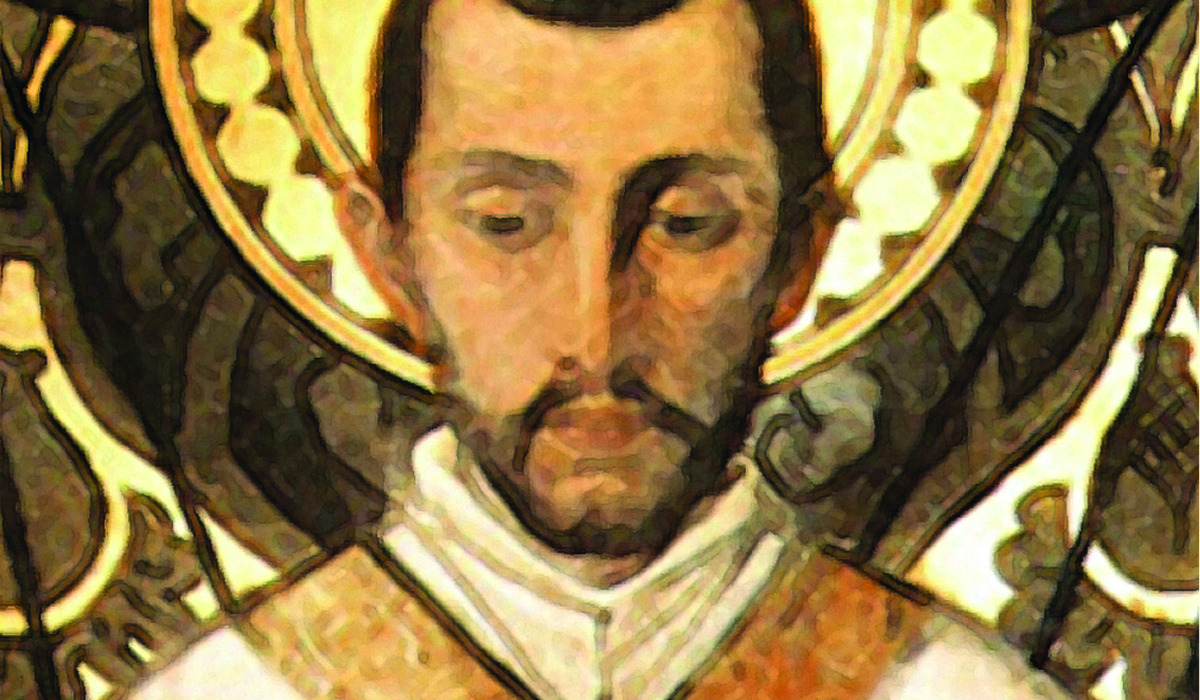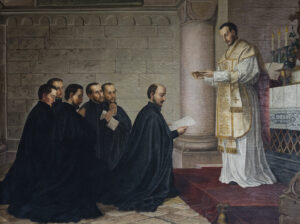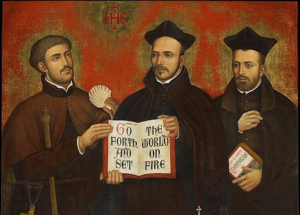
St. Peter Faber was a one of the original members of the Society of Jesus, a missionary priest and reformer. Peter Faber is the anglicized form of the name Pierre LeFèvre or Favre. He was born in 1506 to a family of farmers in a small village in France near Geneva. As a child, Peter took care of his father’s sheep on the Alpine pastures each day, with the exception of Sundays. On Sundays, he could be found teaching the catechism to other children. Even though he had little formal education, he had an extraordinary memory and a great desire to learn. He was able to repeat an entire homily later in the day after having heard it in the morning. When he was ten, he persuaded his father to let him attend a small parish school which was being offered by a priest in a neighboring village. From the age of eleven until he was nineteen, he attended school at another village.
TRANSITION TO PARIS
In 1525, Peter obtained his parent’s permission to seek further education in Paris. He was accepted at the College of Sainte-Barbe at the University of Paris, where he studied philosophy and theology. He shared housing with a young man from Navarre, Spain named [St.] Francis Xavier. In 1529, the pair welcomed another roommate, a somewhat older man also seeking higher education, [St.] Ignatius of Loyola, and the three men became close friends. In 1530, Peter and Francis both earned their Master of Arts degree. Peter went on to be ordained a priest in May of 1534.
A DYNAMIC NEW ORDER IS FORMED

The germ of a new religious order was formed among the three friends with Ignatius as the leader. Later that year, Father Faber received the vows of his former housemates and several more men in the fledgling Society of Jesus. Ignatius made a plan to expand the group and to begin missionary work and chose Father Faber to gather the men together at Venice in early 1537. The group of ten went to Rome to place themselves under the orders of Pope Paul III. After teaching for a time in Rome, Father Faber and another Jesuit were sent to Parma and Piacenza in northern Italy to assist in implementing badly-needed reforms among both clergy and laity. After preaching and teaching the Faith there with much success, Father Faber was sent by the Pope to Germany in 1540. There, he was to participate in the Diet of Worms, a dialogue/debate set up by Holy Roman Emperor Charles V in order to bring some reconciliation to the religious turmoil in Germany at that time. Father Faber was also sent to participate in the Diet of Ratisbon/Regensberg in 1541. Sadly, both of these events bore no fruit, and the spread of heresy and war in Europe continued. From these experiences, he was shocked to learn just how badly the clergy needed reform and also how devastated were the laypeople by the aggressiveness of the Protestant heretics. He realized that the repair would only be obtained by reforming and educating the Catholics, especially the bishops, rather than in discussions with the Protestants.
MUCH LABOR, MUCH FRUIT

Traveling alone and only on foot, Father Faber preached and taught, first in Germany and in his native France. In less than a year, he was tremendously effective at gaining the trust of the clergy and bringing about genuine reform. He used the Ignatian spiritual exercises as a guide for teaching a daily life of faith to be lived out sustained by prayer and the Sacraments. He gave retreats for the laity wherever he went, again with much success. At times being sent about by either Ignatius or the Pope, he preached and taught tirelessly in Spain, Portugal, and Belgium, but mostly in Germany. He attracted many to vocations, including two canonized saints, Peter Canisius and Francis Borgia. In 1546, Father Faber was appointed by the Pope to serve as an expert at the Council of Trent, which was convened to deal with the damage brought about by Protestantism. He left Spain for Rome, on foot as always, and, weakened by his ceaseless efforts at Church reform, he arrived feverish and exhausted. He died in the arms of Ignatius on August 1 at only forty years of age.
St. Peter Faber worked hard to meet people where he found them and win their trust, and he succeeded in recovering many lost sheep. He was gentle, sincere, and a good conversationalist. Coupled with his intelligence and knowledge of the truths of the Faith, this made him a most effective reformer at a time when the Church was in great need of such persons. He had a solid grasp of the principles of Ignatius’s spiritual exercises, and taught it well. He had a great devotion to the saints and angels, especially his own guardian angel, so he knew he was never really alone despite the many hours he spent on foot. He would always call upon the help of a saint associated with an area when entering into it. His remains are at the Church of the Gesu in Rome with those of the other founding Jesuits. His feast day is August 2, and he is a patron for Catholic reformers.
